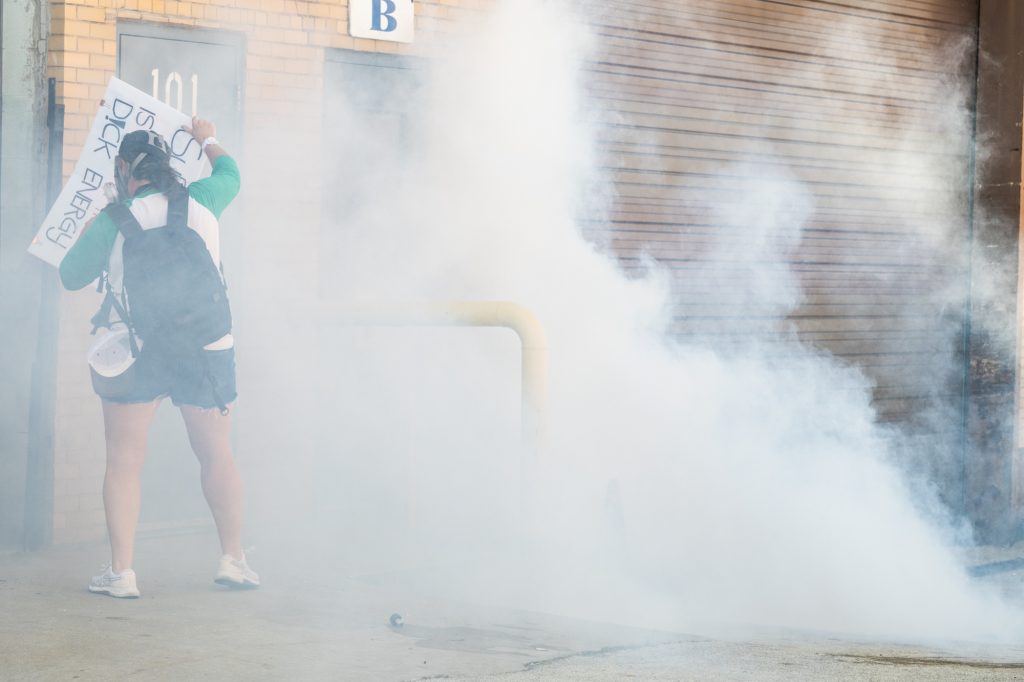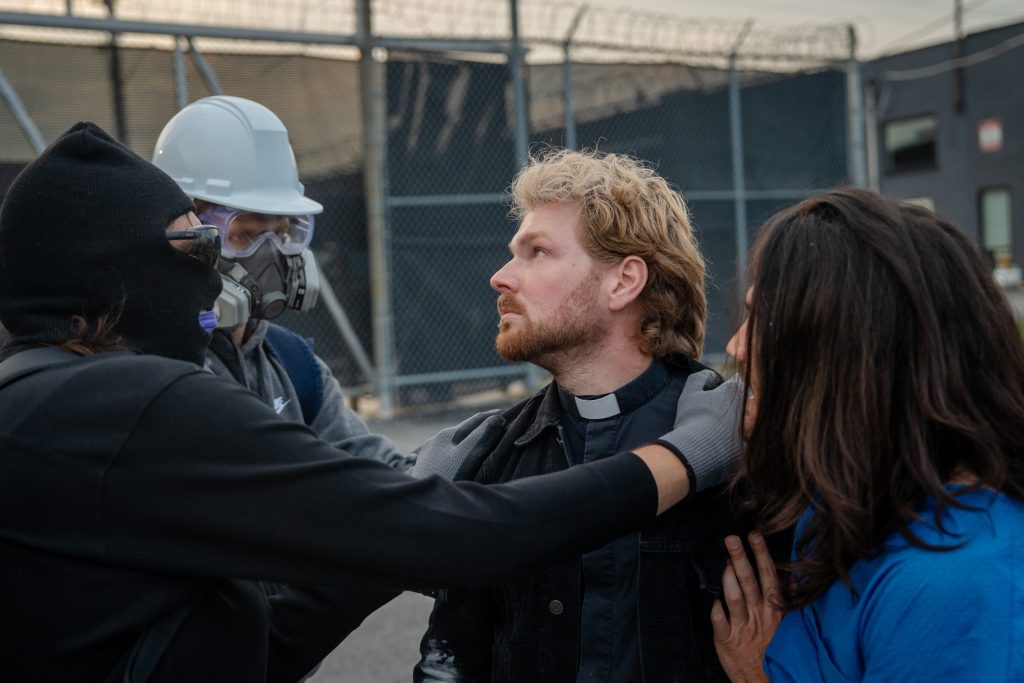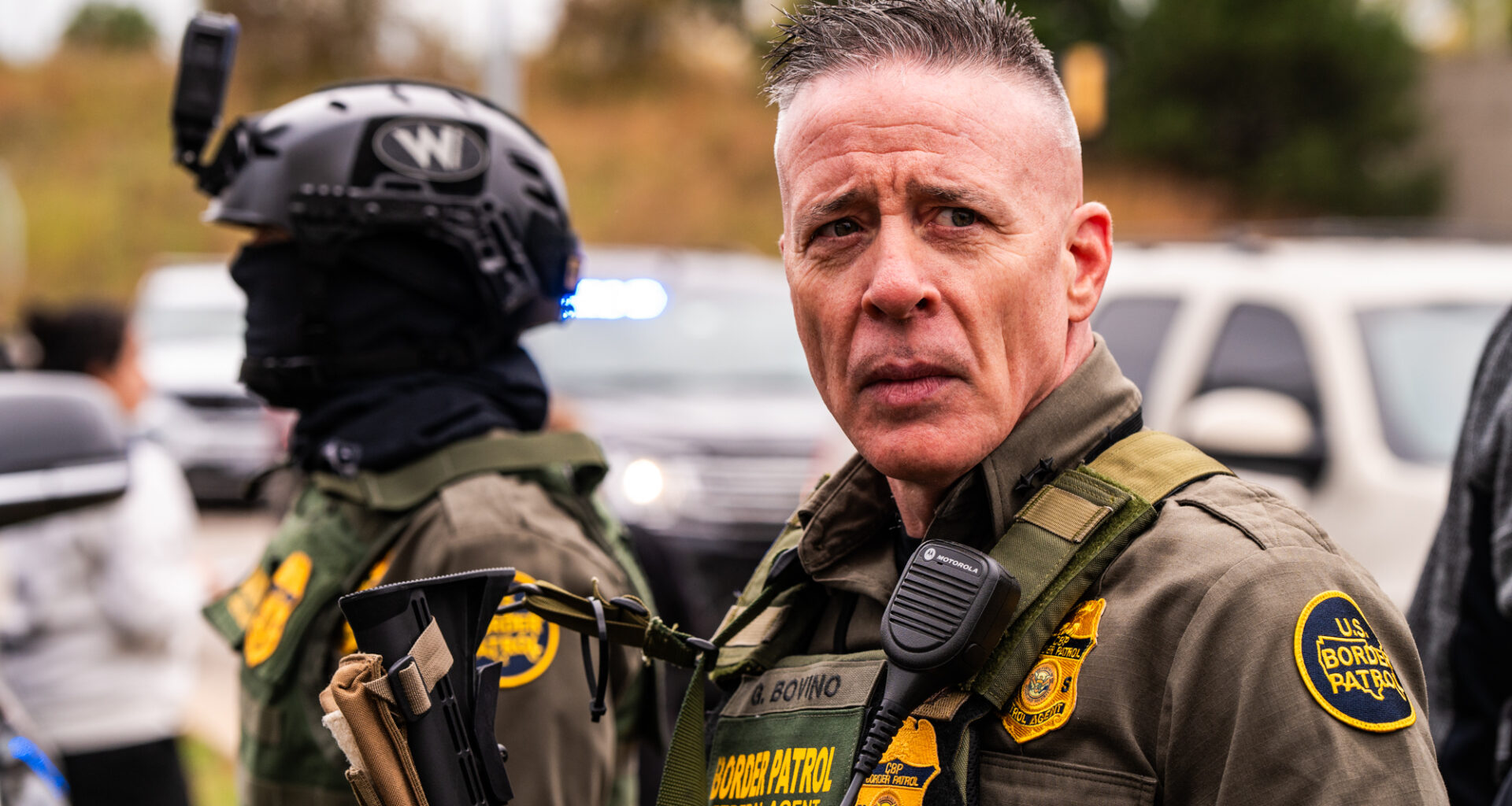CHICAGO — Describing the Trump administration’s depiction of Chicago as “untrue” and “simply not credible,” a federal judge has again ordered federal immigration authorities to limit their use of force during their crackdown in the area.
At a hearing Thursday morning, U.S. District Judge Sara Ellis extended restrictions she put on area immigration enforcement through a temporary restraining order she granted last month. The order limits federal immigration agents’ use of force, including tear gas and riot-control weapons, against peaceful protesters, journalists and others. It also mandates that agents wear badges or display other visible identification, and it requires that most agents use body cameras.
The order is the latest development in a lawsuit filed on behalf of Block Club Chicago and other media organizations that seeks to protect the First Amendment rights of journalists and peaceful protesters.
Before announcing her latest order, Ellis described Chicago as a place “brimming with vitality and hope” as it works to move past a history that includes segregation and violence, with “everyday people standing watch to protect the most vulnerable among us.”
“The government would have people believe, instead, that the Chicagoland area is in a vise-hold of violence, ransacked by rioters and attacked by agitators,” Ellis said. “That simply is untrue. And the government’s own evidence in this case belies that assertion.
“After reviewing all of the evidence submitted and listening to the testimony, I find the defendants’ evidence simply not credible.”
 A protester tries to fan away tear gas with a sign during a protest near the Immigration and Customs Enforcement facility at 1930 Beach St. in Broadview, Ill. on Sept. 26, 2025. Credit: Colin Boyle/Block Club Chicago
A protester tries to fan away tear gas with a sign during a protest near the Immigration and Customs Enforcement facility at 1930 Beach St. in Broadview, Ill. on Sept. 26, 2025. Credit: Colin Boyle/Block Club Chicago
Ellis cited a series of examples. She noted that Border Patrol chief Gregory Bovino, the on-the-ground leader of the federal government’s immigration crackdown in Chicago, admitted in a deposition that he lied when claiming he was hit by a rock before tear-gassing people in Little Village last month.
In another incident, Bovino knocked over a protester, but he denied using force even after watching video of the encounter.
Ellis also pointed to Albany Park neighbors alerting each other and recording video when agents appeared on their block last month — and the agents responding with tear gas.
The government has said agents have used justified force to respond to “rioters” and violence.
“Describing rapid-response networks [and] moms as professional agitators shows just how out of touch these agents are, and how incredible their views are,” Ellis said.
The judge’s ruling Thursday followed about eight hours of testimony Wednesday. The plaintiffs’ attorneys called a series of witnesses to testify about their experiences of being threatened or attacked by immigration authorities in recent weeks.
Bovino was not in person at Wednesday’s hearing. Instead, attorneys for the media organizations shared portions of a videotaped deposition of Bovino taken last week.
In response to questions in the deposition video, Bovino confirmed he had seen agents using force in Chicago — and that he had used force himself. He said he stood by an earlier statement that those uses of force had been “exemplary.”
When a lawyer asked Bovino if that described every single use of force in Chicago, he said he would rate their performance even higher: “All uses of force have been more than exemplary.”
Shown a video of an Oct. 3 incident that shows Bovino knocking down a man later identified as Juan Munoz, a trustee for suburban Oak Park Township, Bovino said, “I see no reportable uses of force.”
Federal agents have repeatedly used riot-control weapons against demonstrators and journalists outside the Broadview facility, including occasions when Bovino was present. But he denied that he had seen “protesters” tear-gassed or shot with pepper balls.
“I would say I’ve seen [tear] gas deployed at violent rioters and assaultive subjects,” Bovino said.
 Rev. David Black looks up to federal agents after being sprayed with pepper bullets as dozens of protesters gather at the entrance of the Immigration and Customs Enforcement facility in Broadview on Sept. 19, 2025. Credit: Audrey Richardson for Block Club Chicago
Rev. David Black looks up to federal agents after being sprayed with pepper bullets as dozens of protesters gather at the entrance of the Immigration and Customs Enforcement facility in Broadview on Sept. 19, 2025. Credit: Audrey Richardson for Block Club Chicago
Attorneys for the plaintiffs also had the court watch video of a Sept. 19 incident. A man identified in court as the Rev. David Black, senior pastor for First Presbyterian Church in Woodlawn, was seen talking to agents on the roof of a building at the Broadview facility. As Black appeared to be praying, with his arms outstretched, agents on the roof fired pepper balls, hitting him several times.
Black didn’t receive any warnings from the agents before he was hit seven times, twice in his head, he testified.
Black said he was scared to return to Broadview for the next two weeks, but he ultimately decided he had to go back and continue to speak out.
“I ended up returning because my Bible … tells me not to be afraid,” Black said.
“I believe I was targeted in this moment because of my ministry, not despite it. There was nothing else I was doing in that moment except visible ministry.”
Some of the other witnesses include Edgewater resident Jo-Elle Munchak, who was threatened by agents on Oct. 10 after she recorded a video of them gathered by a landscaping truck; Catholic priest Brendan Curran, who described being tear-gassed outside of the Broadview ICE facility; and Autumn Reidy-Hammer, a resident of Oak Park who, along with her parents, witnessed agents firing pepper balls at a crowd at Broadview in late September.
Reidy-Hammer testified that her mother said, “It was the most terrifying thing I ever experienced.”
Tesifying for the government, Border Patrol supervisor Kristopher Hewson described several incidents when he said immigration agents had been threatened while working, including during interactions on Oct. 23 in Little Village and Sept. 27 outside the Broadview facility. That includes confiscating “shields” held by several protestors in Broadview that Hewson said had nails protruding from them and could be perceived as weapons.
Government attorneys argued that speech threatening law enforcement officers isn’t protected, and immigration agents have “honored and protected” the rights of peaceful protestors throughout the federal crackdown.
“There’s no evidence to suggest the plaintiffs or anyone else has been targeted for their viewpoints,” said Sarmad Khojasteh, an attorney with the U.S. Department of Justice.
This is a developing story. Check back for updates.
Listen to the Block Club Chicago podcast:
